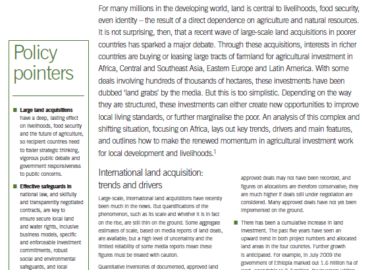The past decades have seen the emergence of a “corporate social responsibility agenda” in response to public and activist criticism of “the impact of transnational corporations (TNCs) in developing countries and on the environment.” This agenda has emerged against the backdrop of shifting perceptions of how the market, the state, and civil society function and ought to function. One prominent version of this agenda has been the World Bank’s advocacy of “good governance” as a “persuasive ethical power that allows for [corporate] self-regulation, making it possible for governments to intervene less intrusively and more efficiently in society.” Voluntary adherence by corporations to good business practices and ethical behavior is a cornerstone of this advocacy, and its most recent incarnation arises in the arena of rural development, focusing on access to land and taking the form of proposals for a Code of Conduct for land deals.
Author: Saturnino Borras Jr. and Jennifer Franco
Published by: Yale Human Rights & Development Law Journal (2010)
Problems with the Idea of Code of Conduct in Land Grabbing



